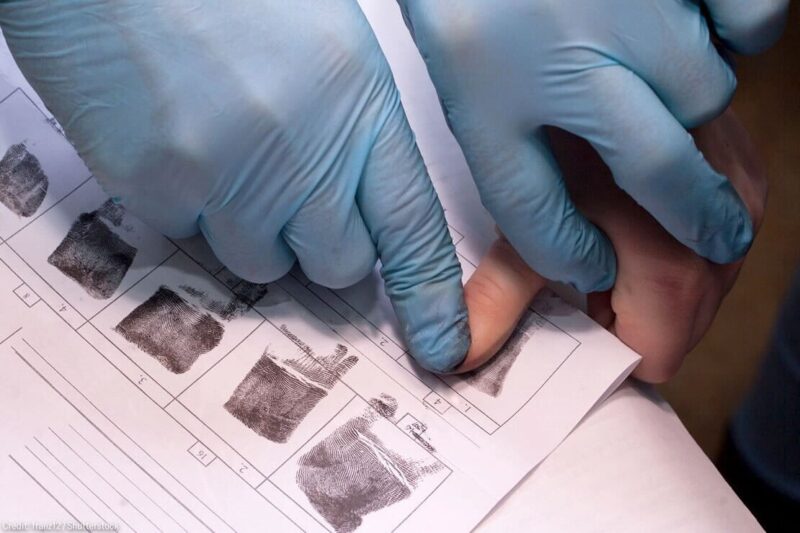Stop-and-Fingerprint Can’t Become the Next Stop-and-Frisk


Two being heard today by the Michigan Supreme Court deserve close attention because of the widespread impact their outcomes could have on policing, the right to privacy, and the ever-expanding technological capability of law enforcement to collect, store, and use our personal data. The cases also highlight an issue that has plagued America for as long as police have existed: Black people being disproportionately stopped and searched by authorities with badges and guns, creating a climate of fear, instilling trauma, and poisoning relationships between law enforcement and the communities they are sworn to protect.
The discrimination is particularly disturbing when the targets are children, which is what Keyon Harrison and Denishio Johnson were when, in separate instances a decade ago, police in Grand Rapids, Michigan violated their constitutional rights by photographing and fingerprinting them on the side of the road, even though they had done nothing wrong. Keyon Harrison was 16 years old when stopped by police while walking home from school in 2012. Denishio Johnson was just 15 when police detained him at a bus stop in 2011. But they were far from being the only ones to have their rights violated.
What’s at stake is anonymity as we know it.
For more than 30 years, police in this western Michigan city have engaged in the egregious, unconstitutional practice of fingerprinting and photographing people they stopped for being “suspicious,” even when no crime occurred, and no arrest was made. Even when people answer officers’ questions and identified themselves, police have routinely fingerprinted them if they happen not to be carrying an ID. As a result, biometric information wrongfully taken from potentially tens of thousands of people remains stored in a police database.
As argued in the lawsuits, this practice violates the United States Constitution’s Fourth Amendment protections against unreasonable searches and seizures. In an opinion piece recently published in the , we explain why what’s happening in Grand Rapids is so concerning:
“We should all be alarmed by the privacy implications of policies that allow the police, just by deeming someone suspicious, to deploy advanced technology that will collect and analyze highly sensitive biometric information and store it in a law enforcement database indefinitely.”
The two cases being heard today by the Michigan Supreme Court — Harrison v. VanderKooi and Johnson v. VanderKooi — are about photographs and fingerprints, but soon we may be confronting iris scanners or even DNA harvesting.
The ACLU has been tracking the development of biometric identification technology — for fingerprints, DNA, retinas, voices, faces, and even gait, among others — for many years, urging caution in its deployment and stringent safeguards in its use. These simple measurements add up to an extraordinary threat to privacy when they are collected, analyzed, and stored in readily searchable databases.
What’s at stake is anonymity as we know it.
Clearly, anyone stopped by the police but innocent of any wrongdoing should never have their biometric information placed in such a database. Which is why one of the goals of the lawsuits in front of the Michigan Supreme Court is to force the destruction of such data wrongly collected by Grand Rapids police. The photographs and fingerprints of Mr. Harrison and Mr. Johnson, and everyone else who had their information similarly taken, should be purged from police records so that privacy can be restored, and justice served.
Unfortunately, this threat to privacy is not borne equally by all of us. What can’t be over-emphasized is the extent to which Black people and other people of color are disproportionately singled out for this sort of abuse. A review of under this policy from 2011 and 2012 found that 75 percent of the people stopped by Grand Rapids police were Black, while just 15 percent were white. This is a huge disparity from the city’s overall racial makeup, which is 21 percent Black and 65 percent white.
We need to reduce interactions with law enforcement, not enable police to gather even more information about people during often harassing stops on the street.
The unconstitutional fingerprinting program widens the disparities even further for young people of color, who are less likely to be carrying an ID because they aren’t old enough to drive, can’t afford an ID, or rely on public transit and so have no need for one. Subjecting these young people to unconstitutional fingerprinting and storing their identifying data in a police database is stigmatizing, traumatizing, and increases the chances of police interactions in the future.
As we have seen repeatedly, a simple interaction with law enforcement on the street for Black and Brown people. We need to reduce interactions with law enforcement, not enable police to gather even more information about people during often on the street.
As we — supported by from a diverse array of organizations, including the Cato Institute, the Washtenaw County Prosecutor, and the NAACP Legal Defense and Education Fund — the Michigan Supreme Court can put a stop to these unconstitutional practices once and for all. If police have probable cause for an arrest, they have long been able to capture fingerprints as part of the post-arrest booking process. But allowing police to compel a person to provide fingerprints while going about their business on the street puts people at the mercy of police whims whenever officers wish to gather this sort of sensitive biometric information, for practically any reason or, in some cases, seemingly no reason at all.
We all have the right to be free from the fear of that happening to any of us.


